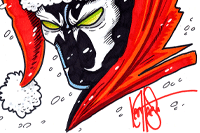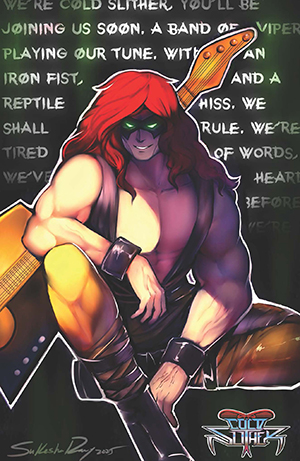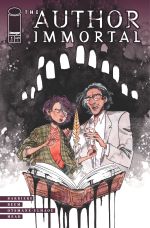|
 |
WAITING
FOR TOMMY: BRYAN TALBOT
By Richard
Johnston
Bryan Talbot
is a very distinctive and distinct comic book creator. His work
may be most familiar to comic book fans from his Legends Of
The Dark Knight, Sandman and Tekno work. But his work goes back
into the early seventies in the equivalent of Britain's Underground
Comics movement, creating the cult Luther Arkwright title, championed
by the likes of Alan Moore and Neil Gaiman, eventually being
picked up by DC and Vertigo to work on their more adult titles,
and recently producing a sequel to Luther, Heart Of Empire,
and a Beatrix Potter themed book about abuse and growing up,
The Tale Of One Bad Rat. His latest project, Alice In Sunderland,
a story playing with the art of telling a story, mixing media,
styles and genres did not get an enthusiastic response from
his publishers, but was able to get eight instant inquiries
after the industry was made aware of its existence.
The influence of Bryan's work can be felt across British
comics, from direct inspiration such as the appearance of
Talbot regular Chester Williams in Swamp Thing, the moment
where Chester sees the reader, while on a drug trip being
reflected in Animal Man, to a general influence in terms of
expanding subject matter, playing with multiple universes
and creating finite graphic novels in serial form. Bryan took
time to speak about what's expected of his work, the state
of the industry and the most perfect comic book shop on God's
Earth. RICHARD
JOHNSTON: Bryan, your work has influenced the likes of
Alan Moore, Grant Morrison, Warren Ellis, the leading lights
of British writers. You continue to publish new, challenging
works and influence the industry. Yet you don't seem to fit
into it in any tangible way, and others seem more capable
of exploiting their presence in commercial ways. What do you
feel your role is, and do you ever feel like seeking what
others may believe is due you, in financial terms?
BRYAN
TALBOT: My role? Telling stories in comics. I'd get bored
doing the same sort of thing all the time, so I like working
on different sorts of stories, adapting my style to each story,
which probably answers your second point. Someone once said
that if all I'd done throughout my career was Luther Arkwright
stories, I'd be a lot more well known with Arkwright becoming
an established comic icon - sort of like Herge and Tintin.
As for the financial side, I'm doing OK and still get regular
royalties from Arkwright, Bad Rat, Sandman, etc. on top of
bread and butter work.
Pages:
1 | 2
| 3 | 4
| 5 Continued
Here... |
 |






